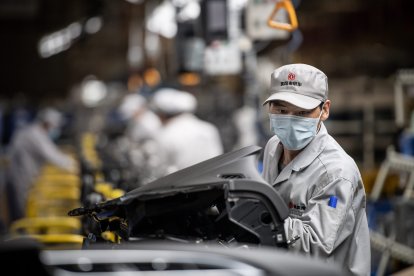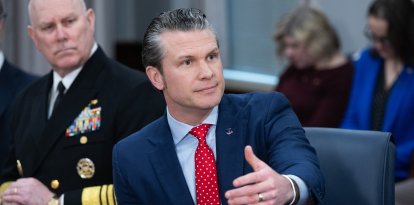ANALYSIS.
China's journey at the WTO: From Clinton's optimism to Trump's skepticism
Experts note that, during its more than two decades of membership, the Chinese government has taken advantage of the body for its "tremendous" growth. "Sometimes it violates the letter of the law, sometimes the spirit"

Automobile factory in Wuhan, China.
Experts agree that the controversial entry of communist China into the World Trade Organization (WTO) has had one clear winner: communist China itself.
In a complaint filed Tuesday, Beijing requested the international institution to intervene "to defend its legitimate rights and interests" against Trump's "egregious" tariffs.
Now, 23 years after its accession, the Asian giant, which is bigger than ever, has once again resorted to the levers of the WTO to strike back at the United States, the country that once strongly supported its inclusion.
Chinese openness, American optimism
"The more China liberalizes its economy, the more fully it will liberate the potential of its people -- their initiative, their imagination, their remarkable spirit of enterprise," said President Bill Clinton in 2001, the year Beijing joined the WTO.
By joining the body, Clinton claimed it "is not simply agreeing to import more of our products; it is agreeing to import one of democracy's most cherished values: economic freedom. And when individuals have the power, not just to dream but to realize their dreams, they will demand a greater say."
The Democrat's words reflect the optimism in the West at the time regarding Communist China. The fragile U.S.-China relationship had begun in the late 1970s when the two countries established diplomatic ties. Clinton framed the upcoming WTO membership as the culmination of two key milestones from that decade: the first trip by a U.S. president to China (Richard Nixon, in 1972) and the official signing of mutual recognition (Jimmy Carter, in 1978).
Proponents of Chinese accession argued that it would bring a dual benefit: economic gains for the United States and the democratic world, and political reforms within the People's Republic of China. Regarding the former, they highlighted China's vast market, home to one-fifth of the global population. Upon joining, China would lower tariffs on imported goods, and foreign companies would gain the ability to export products without the need to establish factories in the country.
The anticipated domestic reform never materialized. More than two decades later, Clinton's description of China at the time remains accurate, word for word: "China is a one-party state that does not tolerate opposition. It does deny citizens fundamental rights of free speech and religious expression."
Experts from the Fundación Disenso, a think tank linked to the Spanish Vox party, described it as a naive "over-optimism," which led to Chinese economic growth that strengthened its model. They argued it granted "false legitimacy" to Beijing's "repressive dictatorship" and planned economy.
This naivety, they say in a report on China's path in the WTO, would ultimately harm both the organization and the United States.
China's "tremendous" rise
As the 143rd member of the multilateral institution, China reached several economic milestones: in 2004, it became the leading exporter in Asia, and five years later, the largest exporter globally, as well as the second-largest importer of goods. In 2010, it became the world's second-largest economy. Eight years later, it overtook the U.S. to become the country with the most billionaires and the second-largest number of millionaires.
Those milestones, collected by Disenso, yield surprising results: "Its income per capita —measured in purchasing power parity— has gone from being equivalent to that of Sudan to that of Mexico."
The Council on Foreign Relatinos describes this growth as "tremendous." "Since 2001, China’s economy has grown more than five-fold, adjusted for inflation," they note. "Hundreds of millions of people have escaped extreme poverty as a result of this growth."
Most experts acknowledge that China's membership in the trade organization was a key factor in its growth. However, they also agree, as mentioned earlier, that the initial goal of political reform through economic progress has failed. Some analysts, such as those at the Council on Foreign Relations, argue that China has not even fully adapted to the organization's rules, often ignoring those that do not align with its interests while "taking advantage of the provisions that suit its needs. Sometimes it violates the letter of the law, sometimes the spirit."

World
Marco Rubio reaches immigration agreements and progress against China in Costa Rica
Luis Francisco Orozco
The think tank stated that, between 2001 and 2021, the United States filed 23 of the 43 complaints against China before the WTO. The most common grievances included providing illicit state subsidies to promote domestic product exports, discriminating against foreign companies, and tightly controlling supply chains to export finished products rather than raw materials.
"The Chinese regime has systematically made an abusive and arbitrary use of State subsidies, falsifying inventions and technologies, as well as exercising undue pressure to ensure the transfer of forefront technology belonging to global companies that have sought to trade with China or set up operations in the country," Disenso said. In part, they blame the West: it got used, they say, to look for the best possible Chinese dictatorship, without recognizing that the real problem is its internal system.
"Acceptance of clear rules of the game only constrains those who intend to comply or those who have too many implicit costs for failing to comply," they state, offering this as a central insight into China's recent WTO record.

Política
The Department of State orders the closure of USAID missions abroad and the withdrawal of its personnel
Emmanuel Alejandro Rondón
Trump, critical of the WTO
U.S. administrations have increasingly distanced themselves from the trade body. The Bush administration imposed tariffs on some Chinese products, followed by the Obama administration, which set additional tariffs. The first Trump administration then added even more, and Biden has followed suit.
Moreover, Obama and his predecessors blocked new appointments to the WTO Appellate Body, causing claims like this week's from China against Trump's tariffs to lose momentum. These claims have now become mostly symbolic. Currently, the body cannot form a quorum due to a lack of judges.
Rubberstamping the first tariffs of his second term, Trump responded to a Wall Street Journal editorial by claiming that anyone opposing the measure was "controlled by China, or other foreign or domestic companies." While he did not explicitly mention it, the WTO was one of the critical voices.
On previous occasions, Trump directly criticized the institution's relationship with Beijing. During a campaign rally in Detroit last year, for example, he argued that China's entry into the organization was a major factor in the loss of 40 percent of Michigan's auto jobs. "[It] was a disaster for your beautiful place, your beautiful city, and frankly, your beautiful state."
In addition to filing his WTO complaint, Chinese leader Xi Jinping responded to Trump's tariffs with tariffs of his own. "Another all-or-nothing bet gamble by Beijing," described Disenso in a statement published by VOZ.
RECOMMENDATION























